Stainless Steel Bearings
Table of Contents
Definition
Stainless steel bearings are a type of rolling element bearing made from stainless steel materials, typically AISI 440C or AISI 304. These bearings are designed for use in environments where corrosion resistance and hygiene are essential, such as in the food and beverage industry, medical equipment, and marine applications. The stainless steel construction provides excellent resistance to rust and corrosion, making them ideal for use in damp or corrosive conditions.
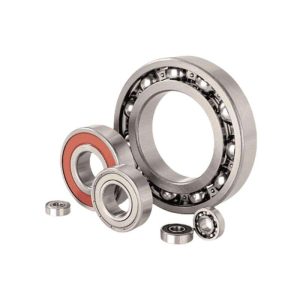
FHD Bearings is an ISO 9001:2015 certified manufacturing enterprise . Our company boasts a diverse range of high-quality products, ensuring a comprehensive selection to meet varied industry needs. Our extensive and well-maintained inventory underscores our commitment to providing clients with readily available solutions for their business requirements.
Materials
-AISI 304 stainless steel is also a commonly used material with good corrosion and high temperature resistance for general industrial applications and the food industry.
– In selecting materials for FHD Bearings, our emphasis on 304 stainless steel bearings prioritizes corrosion resistance, durability, and optimal performance in challenging environments. We meticulously consider factors such as metallurgical properties, load-bearing capacity, and longevity to ensure our bearings meet the highest standards for B2B applications.
– AISI 316 stainless steel offers improved corrosion resistance, especially for use in chloride environments such as seawater and chemical processing equipment.
–In the meticulous material selection process at FHD Bearings, our focus on 316 stainless steel bearings centers around superior corrosion resistance, exceptional strength, and longevity. We prioritize metallurgical attributes, load-bearing capabilities, and adherence to stringent quality standards to ensure our bearings crafted from 316 stainless steel meet the exacting demands of diverse industrial applications.
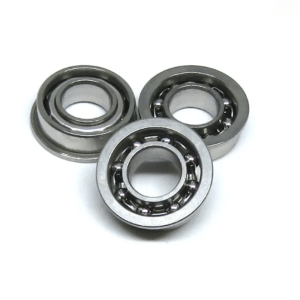
– One of the most common materials used for stainless steel bearings is AISI 440 C. It has excellent corrosion resistance and high strength for use in a variety of harsh environments, such as chemicals and high temperature conditions.
– In FHD Bearings’ rigorous material selection, we chose 440C stainless steel for our bearings, underscoring our commitment to superior corrosion resistance, high hardness and enhanced wear resistance. Our 440C stainless steel bearings prioritize metallurgical performance, load-carrying capacity, and are carefully crafted to exacting quality standards.
Stainless Steel(AISI 440B)
– AISI 440B stainless steel is a high carbon stainless steel material with higher hardness and wear resistance for some applications that require higher loads and high speed rotation.
Features
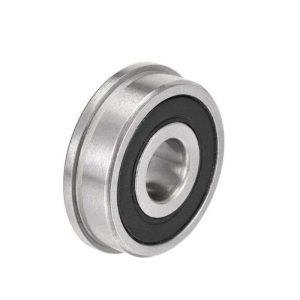
- Corrosion Resistance: Exceptional resistance to corrosion ensures longevity and reliability in challenging environments, making them ideal for industries with stringent hygiene standards.
Durability:Robust construction enables our stainless steel bearings to withstand heavy loads and endure tough operating conditions, contributing to extended equipment lifespan.
High Precision:Precision machining and advanced manufacturing techniques result in bearings with tight tolerances, facilitating smooth and efficient machinery operation.
Versatility:Suitable for diverse industries, including food processing, medical equipment, and more, our stainless steel bearings adapt to a wide range of applications.
Temperature Resistance:Capable of performing consistently across a broad temperature range, these bearings maintain reliability in both high-heat and low-temperature environments.
Low Maintenance:The inherent properties of stainless steel reduce the need for frequent maintenance, providing a cost-effective and efficient solution for long-term use.
Customization Options:Available in various sizes and configurations, our stainless steel bearings can be tailored to meet the specific requirements of your machinery, ensuring optimal performance.
Quality Assurance:Manufactured to the highest industry standards, our bearings undergo rigorous quality control measures to guarantee consistency, reliability, and adherence to your business’s exacting specifications.
Advantages
- Hygienic and Sanitary:
In industries such as food and pharmaceuticals, where cleanliness is paramount, stainless steel bearings are a preferred choice. They are easy to clean and maintain, meeting stringent hygiene standards and minimizing the risk of contamination.
Strength and Durability:The robustness of stainless steel enhances the strength and durability of bearings, enabling them to withstand heavy loads, resist wear and tear, and extend service life.
- Aesthetic Appeal:In addition to their functional benefits, stainless steel bearings have a smooth and aesthetic appearance. This can be an advantage in applications where aesthetics are important, such as consumer products or high-end machinery.
Non-Magnetic Properties:Stainless steel is non-magnetic, which is advantageous in applications sensitive to magnetic interference. This property makes stainless steel bearings suitable for use in electronic or precision equipment.
Environmental Sustainability:Stainless steel is a fully recyclable material that meets modern sustainability practices. Choosing stainless steel bearings demonstrates a commitment to environmentally friendly solutions and contributes to an organization’s overall green initiative.
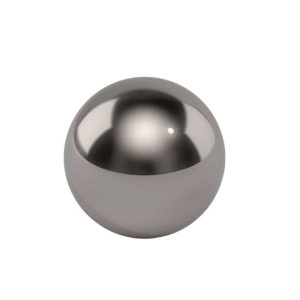
Taxonomy
Stainless Steel Ball Bearings

AISI440C Stainless Steel Ball Bearings
Stainless steel ball bearings made of 440C have excellent corrosion resistance and hardness for demanding industrial applications.

AISI304 Stainless Steel Ball Bearings
Stainless steel ball bearings made of 304 have good corrosion resistance and versatility and are suitable for a wide range of industrial applications.

AISI316L Stainless Steel Ball Bearings
Stainless steel ball bearings made of 316L offer excellent corrosion and high temperature resistance, making them ideal for corrosion-resistant and extreme environments.

Stainless Steel Ball
Stainless steel ball with excellent corrosion resistance and mechanical strength, suitable for a variety of industrial applications, to ensure efficient and stable operation
Stainless Steel Thrust Ball Bearings

Stainless Steel Miniature Thrust Bearings
Stainless steel thrust ball bearings with excellent load carrying capacity and corrosion resistance are suitable for industrial applications that need to handle high load carrying capacity and thrust loads

Stainless Steel Single Direction Thrust Ball Bearings
Stainless steel Single Direction thrust ball bearings are designed for unidirectional thrust loads, combined with excellent corrosion resistance, and are suitable for industrial scenarios with special requirements for thrust transmission.

Stainless Steel Double Direction Thrust Ball Bearings
Stainless steel double-directional thrust ball bearings are suitable for bi-directional thrust loads and are corrosion-resistant, providing reliable performance for industrial applications requiring bi-directional thrust transmission.
Stainless Steel Flanged Ball Bearings

Stainless Miniature Flanged Ball Bearings
Stainless steel miniature housed ball bearings have a small and delicate design for applications with limited space and high precision requirements, ensuring reliability and superior performance.

Stainless Miniature Flanged Ball Bearings With Extended Inner Ring
Stainless steel miniature flanged ball bearings with extended inner rings are uniquely designed for special space requirements and offer excellent corrosion resistance and a high degree of precision.

Stainless Large Size Flanged Ball Bearings
Stainless steel large flange ball bearings are suitable for heavy-duty and high speed applications, combining excellent corrosion resistance to ensure reliable performance in demanding environments.
Stainless Steel Angular Contact Ball Bearings

Stainless Steel Double Row Angular Contact Ball Bearings
Stainless steel double row angular contact ball bearings combine high load carrying capacity and stability and are suitable for industrial applications where high precision and rigidity of the bearing system is required.

Stainless Steel Single Row Angular Contact Ball Bearings
Stainless steel single row angular contact ball bearings combine high load carrying capacity with good rotational performance for industrial applications requiring high precision and rigidity.
Stainless Steel Self Aligning Ball Bearings

Stainless Steel Self Aligning Ball Bearings
Stainless steel self-aligning ball bearings have excellent self-aligning capabilities for industrial applications dealing with off-center and vibration, ensuring smooth operation and high reliability.

Stainless Steel Self Aligning Ball Bearings
Stainless steel self-aligning ball bearings are known for their excellent self-aligning ability and are suitable for dealing with off-center shafting and vibration, ensuring that they provide stability and reliability in a variety of industrial applications.
Applications
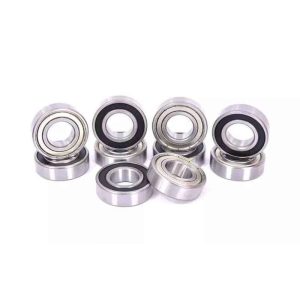
Food and beverage industry:Stainless steel bearings are suitable for food contact equipment and are corrosion resistant and hygienic, meeting food safety standards.
Medical Equipment:In medical equipment, stainless steel bearings are often used in high-precision medical equipment because they are not easy to rust and have high cleaning requirements.
Chemical industry:As stainless steel bearings have excellent corrosion resistance, they are widely used in fields such as chemical production and handling.
Marine Engineering:In the marine environment, stainless steel bearings are able to resist salt water corrosion, so they are widely used in ships and marine engineering equipment.
Electronics and semiconductor manufacturing:Stainless steel bearings play a role in high-precision electronic equipment and semiconductor manufacturing, meeting application scenarios that require cleanliness and corrosion resistance.
Aerospace industry:In the aerospace sector, stainless steel bearings are widely used as key components in aircraft and spacecraft because they are lightweight, corrosion-resistant and stable.
Automotive Industry:In automotive production, stainless steel bearings are commonly used in components to provide long life and high performance.
Textile Industry:Stainless steel bearings are used in textile machinery to resist corrosion from fibers and textile fluids and extend equipment life.
Key Manufacturing Process of Stainless Steel Bearings
Material Selection:
Begin with the selection of high-quality stainless steel as the raw material, typically grades such as 440C, 304, 316L, or other corrosion-resistant alloys depending on the application requirements.
Forging or Casting:
The selected stainless steel is either forged or cast into the desired shape, forming the basic structure of the bearing components. Forging is often preferred for its ability to enhance the material’s mechanical properties.
Turning and Machining:
The forged or cast components undergo precision turning and machining processes to achieve the required dimensions, smooth surfaces, and accurate tolerances. This step ensures the proper fit and functionality of the bearing.
Heat Treatment:
Stainless steel bearings undergo heat treatment to improve hardness, strength, and overall mechanical properties. Heat treatment processes may include quenching and tempering, aimed at achieving the desired balance of hardness and toughness.
Quality Inspection:
Rigorous quality control measures are implemented to check for dimensional accuracy, surface finish, and overall product quality. Non-destructive testing methods may be employed to identify any defects.
Packaging and Shipping:
The finished stainless steel bearings are packaged according to industry standards, ensuring protection during transit. Proper documentation is included, detailing specifications and compliance with relevant standards.

FAQ - Frequently Asked Questions
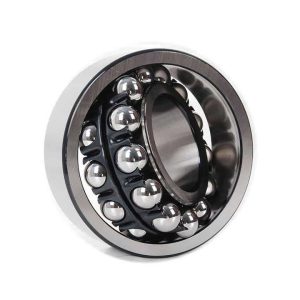
Stainless steel bearings offer excellent corrosion resistance, making them ideal for applications in harsh environments.
Yes, stainless steel bearings are known for their ability to withstand high temperatures, making them suitable for various industrial settings.
Yes, stainless steel bearings are often designed to handle high-speed operations with low friction and reduced heat generation.
Use appropriate lubricants and follow recommended lubrication schedules to ensure optimal performance and longevity of stainless steel bearings.
While stainless steel bearings are corrosion-resistant, regular cleaning, lubrication, and monitoring for wear are essential for optimal performance.
Yes, stainless steel bearings are commonly used in food processing and pharmaceutical industries due to their corrosion resistance and compliance with hygiene standards.
Stainless steel bearings find applications in industries such as food and beverage, medical, marine, and chemical processing, among others.
Implement effective seals and shields, maintain a clean working environment, and follow proper handling procedures to prevent contamination.
In some cases, yes, but stainless steel bearings are chosen for their corrosion resistance, so the replacement should consider the environmental conditions.
Proper lubrication, correct installation, appropriate load distribution, and protection against contamination are key factors influencing the lifespan of stainless steel bearings.
Installation and Maintenance
Installation
Clean Work Environment:Ensure the work area is clean and free from dust or contaminants that could affect the bearings.
Inspect Bearings:Before installation, carefully inspect the stainless steel bearings for any damage or abnormalities.
Proper Handling:Handle bearings with clean hands or gloves to avoid introducing contaminants.
Correct Fit:Ensure the bearing fits accurately onto the shaft and into the housing. Follow manufacturer specifications for fit tolerances.
Alignment:Align the bearings properly to prevent uneven loads and premature wear. Misalignment can lead to reduced performance.
Use Appropriate Tools:Use the right tools for installation to avoid damaging the bearings or their components.
Lubrication:Apply the correct lubricant in the right amount according to manufacturer recommendations.
Seals and Shields:Check and install seals or shields to protect the bearings from contaminants and retain lubrication.
Tightening Procedure:Follow the recommended tightening procedure for locking devices to prevent over-tightening or insufficient tightening.
Verify Installation:After installation, rotate the shaft to confirm smooth operation and ensure there are no unusual sounds or vibrations.
Maintenance:
Regular Cleaning:Implement a routine cleaning schedule to remove dirt and contaminants from the bearing surfaces.
Lubrication Maintenance:Regularly check and replenish lubrication to ensure proper function and prevent overheating.
Inspection:Periodically inspect the bearings for signs of wear, damage, or corrosion. Replace any damaged components promptly.
Temperature Monitoring:Monitor operating temperatures regularly. Elevated temperatures may indicate issues with lubrication or alignment.
Seal Integrity:Check the integrity of seals and shields to ensure they effectively protect the bearings from contaminants.
Vibration Analysis:Conduct vibration analysis to detect potential issues early and prevent catastrophic failures.
Alignment Checks:Verify shaft and bearing alignment periodically to avoid uneven loads and premature wear.
Load Distribution:Ensure that loads are distributed evenly to prevent localized wear and extend bearing life.
Training and Education:Train maintenance personnel on proper bearing handling, installation, and maintenance procedures.
Record Keeping:Maintain detailed records of installation dates, maintenance activities, and any issues encountered for effective tracking and future reference.




